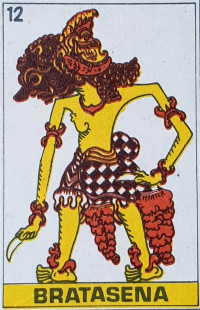Wayang Bratasena
Unleashing the Inner Strength of Wayang's Fiercest Warrior.
In the epic sagas of Wayang Kulit, where shadows dance and myths come alive, Bhima, also known as Bratasena, stands as a towering figure. More than just a warrior of immense strength, he embodies the raw power within us, the primal force that can be both destructive and redemptive. This article delves into the captivating world of Bhima, exploring his fiery nature, complex journey, and the enduring lessons etched in his legend.

Strength Incarnate
Often depicted with bulging muscles and fierce features, Bhima's physical prowess is unmatched. He wields the mighty Gada mace, capable of shaking mountains and crushing enemies. His strength isn't just physical; it stems from his immense appetite, consuming vast quantities of food to fuel his boundless energy. These attributes establish him as the ultimate protector, the defender of his family and the embodiment of unyielding courage.
From Impulsiveness to Wisdom
Bhima's journey is as turbulent as his strength. Driven by raw emotions and impulsiveness, he often leaps into action without hesitation. His temper flares quickly, leading to clashes with his calmer brother, Yudhisthira. Yet, through trials and tribulations, Bhima learns to temper his impulsiveness with wisdom. He recognizes the value of strategic thinking and collaboration, evolving into a more balanced and formidable warrior.
More Than Just Brute Force
While strength defines Bhima, he is not merely a muscle-bound warrior. He possesses loyalty and devotion unmatched. He stands by his brothers through thick and thin, their bond transcending differences in personality. His loyalty extends beyond family, earning him the respect and trust of allies. This complex tapestry of traits reminds us that true strength lies not just in physical prowess but also in emotional intelligence and unwavering commitment.
Symbolism and Evolution
Bhima's connection to the wind god Vayu is reflected in his powerful movements and swiftness. His mace signifies both destruction and protection. Over time, Bhima's portrayal has evolved across regions and styles, sometimes highlighting his fierce nature, while others emphasize his loyalty and wisdom. This evolution mirrors the multifaceted nature of human strength and the complexities of navigating its potential.
Beyond the Shadow Stage
Bhima's influence extends far beyond the Wayang Kulit stage. He appears in various forms of Indonesian art, literature, and even contemporary media, serving as a symbol of strength, loyalty, and overcoming challenges. His enduring popularity reflects the universal human desire for power and the importance of channeling it responsibly.
Last updated